What Can & Can’t Go Down the Drain?
Ever stared down at a drain and wondered, “Can I really flush this?” We’ve all been there! Understanding what should and should not go down your drains is crucial for maintaining a functional and efficient home drainage system. Let’s go over the dos and don’ts of what goes down your drains so that you can prevent clogged drains and future headaches.
Common Causes of Clogged Drains
When it comes to what you can safely put down a drain, it’s important to consider both the health of your plumbing system and the environment. The substances and items that go down your drain can have lasting impacts, from creating clogs in your home’s plumbing to affecting local water treatment facilities.
Many everyday items can contribute to a drain clog, but being mindful can help prevent these common issues. Some of the things you should never put in the drain include:
- Food Scraps: Even with a garbage disposal, certain food scraps should never go down your kitchen sink. Avoid disposing of coffee grounds, eggshells, and starchy foods like pasta and rice, which can swell and create blockages.
- Produce Stickers: Produce stickers may seem small and harmless, but they are not water-soluble and can stick to the insides of pipes or contribute to other debris building up, leading to blockages.
- Grease and Oil: One of the worst offenders in the kitchen is grease. Avoid pouring grease down any drain as it solidifies upon cooling and clings to your pipes, causing severe clogs.
- Non-Degradable Items: In the bathroom, items like cotton balls, dental floss, swabs, wipes (even those labeled flushable), and feminine hygiene products should never be flushed as they do not break down and can block sewer lines.
- Overloading Drains: Overloading any drain in your home, whether it’s in the kitchen, bathroom, or utility room, can lead to serious clogs. This includes not only excessive toilet paper but also things like cooking grease in the kitchen sink, hair in the bathroom sink or shower, and larger debris or insoluble materials that should not be introduced into the drainage system.
- Paper Towels and Napkins: Paper towels and napkins are designed to be absorbent and do not dissolve in water like toilet paper. When flushed or washed down drains, they swell up and can quickly clog pipes and sewer lines, leading to significant plumbing issues.
- Condoms: Condoms are made from materials that are not biodegradable (typically latex or polyisoprene), and they do not break down in water. Flushing condoms can lead to clogs in your home plumbing and problems in sewer systems, as they can get caught in other debris and form blockages.
- Paints and Solvents: Paints and solvents contain chemicals that can be hazardous to the environment and harmful to water treatment processes. When washed down the drain, they can contaminate water supplies, harm aquatic life, and damage the plumbing and sewer infrastructure with their corrosive properties.
- Medications: Disposing of medications down the drain can lead to water pollution and pose risks to aquatic life and the broader environment. Many medications contain substances that are not removed by wastewater treatment processes, leading to contamination of rivers, lakes, and community water supplies.
The Harm of Chemical Drain Cleaners
While it might be tempting to use a chemical drain cleaner to quickly clear a clogged drain, these products can be harmful to your plumbing system. Chemical drain cleaners are corrosive and can eat away at old pipes, especially those made from materials like galvanized steel or cast iron.
It’s also worth noting that they are harmful to the environment and can pose health risks if not used correctly. Instead, opt for mechanical methods like plunging or professional cleaning when dealing with stubborn blockages.
What Can You Safely Put in a Drain?
While there are many things that should never be put down the drain, there are many things that still can, including:
- Cold Water: Running cold water down the drains after each use can help clear residual debris that might stick to the pipes.
- Hot Water: Regularly flushing out drains with hot water (not boiling) can help dissolve and dislodge soap scum and other fatty residues.
- Mild Dish Soap: In moderate amounts, mild dish soap can help clean pipes and prevent the buildup of grease and oil.
- Baking Soda: A natural cleaning agent that helps maintain clean and odor-free drains when used regularly.
- White Vinegar: An effective cleaner that can safely break down minor clogs and kill bacteria without harming your pipes or the environment.
- Lemon Peels: Small amounts can help freshen up your garbage disposal and keep your kitchen sink smelling clean. Ensure to grind them thoroughly in the disposal.
The Role of Garbage Disposals and Drain Strainers
Just because you have a garbage disposal, it doesn’t mean you can throw everything down your kitchen sink. It’s designed to handle light food residue that is rinsed from plates and cookware, not to grind up large quantities of food waste. To aid your garbage disposal and prevent clogs:
- Use a Drain Strainer: This simple tool can catch food scraps and other debris that are inadvertently washed down the drain.
- Run Cold Water: Always use cold water when running your garbage disposal, as it helps to solidify any grease or oils into solids, making it easier to grind and flush away.
Contact Us to Schedule Professional Drain Cleaning Services in NJ
If you’re experiencing issues with your drains or just want to perform routine maintenance, contact All Clear Drain Cleaning. Our team provides quick and efficient drain cleaning services in East Brunswick to eliminate tough clogs, as well as sewer repair services and water line repair services to address urgent issues and restore normalcy to your home. Reach out today to learn more about how we can help you keep your drains flowing smoothly and your home plumbing problem-free.
